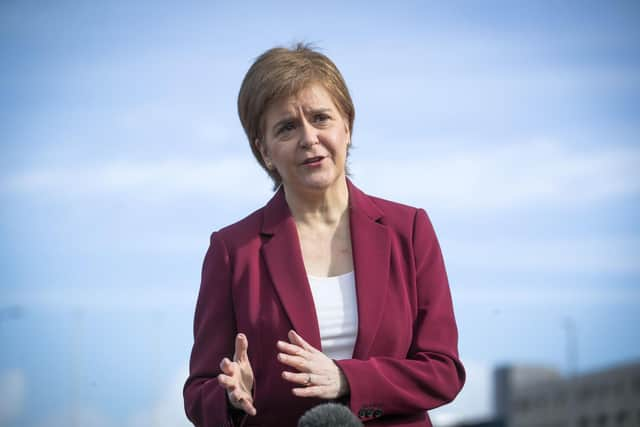Coronavirus: Vaccine passports must be on world-wide basis, says Jason Leitch
While First Minister Nicola Sturgeon said the idea of “vaccine passports” should be considered “in principle”, she reiterated her concerns about equity and ethics in how they could be used, given certain people would not receive a vaccine because of “medical reasons”.
At the Scottish Government Covid briefing on Tuesday, Ms Sturgeon said the passports were "not practical right now”, but “should be given proper consideration” for future use.
Advertisement
Hide AdAdvertisement
Hide AdShe said there had been four-nation government discussions about the proposal.


However, Prof Leitch said the introduction of passports was “not as easy as it sounds”.
He said: “It’s enormously complex … it has inequality challenges, it has challenges around those who are unvaccinated, like children.
"We would be most comfortable if the world does it and if the WHO lead that thinking for us, and then, across the four UK countries, the clinical advisers will give the best advice to the governments.”
Asked if the government was alarmed by international data, where cases are rising again, such as in Chile – despite a successful vaccination programme – chief medical officer Dr Gregor Smith said Scottish public health officials were learning the lessons of other countries to “incorporate into our approach”.
"It shows why we’re taking a slightly more cautious approach so we don’t see a surge in cases despite the fact we’re doing so well with vaccination,” he said.
"We’re looking at more detail to see why there have been increasing case numbers despite the fact they have an active vaccination programme.
"It’s very complex, but they had begun to open up the country sometime earlier in vaccination programme from us and that may have influenced case numbers. We saw some evidence that a relaxation of travel restrictions had allowed infection in some parts of the country to spread.
Advertisement
Hide AdAdvertisement
Hide Ad“The experience showed that you cannot become complacent in the way you begin to exit the lockdown restrictions.”
Prof Leitch said preventing the import and export of viral cases, as well as new variants, was “absolutely crucial to any country’s response”.
"You need to look at France going back into lockdown, Poland, the Czech Republic and Estonia all accelerating and ‘in trouble’ – so that speaks to why we need to think very seriously about import and export of the virus," he said.
Ms Sturgeon said these issues would affect the opening up of international travel.
“We’re not able to give a date,” she said.
"We said when we outlined our indicative timetable it wouldn’t be before May 17 – the date the UK government gave. I said at the time I thought it wouldn’t be for some time after that.
“The UK Government will make its own decision, but the four-nation discussions we’ve had makes me sceptical about whether international travel will resume in England from May 17.”
She added: “The international data, around France and Chile, for example, really does drive home to us that if we want to get maximum normality in Scotland over the next few weeks and months, perhaps the price we have to pay for that is not having international travel for longer.”
A message from the Editor:Thank you for reading this article. We're more reliant on your support than ever as the shift in consumer habits brought about by Coronavirus impacts our advertisers.
If you haven't already, please consider supporting our trusted, fact-checked journalism by taking out a digital subscription.
Comments
Want to join the conversation? Please or to comment on this article.